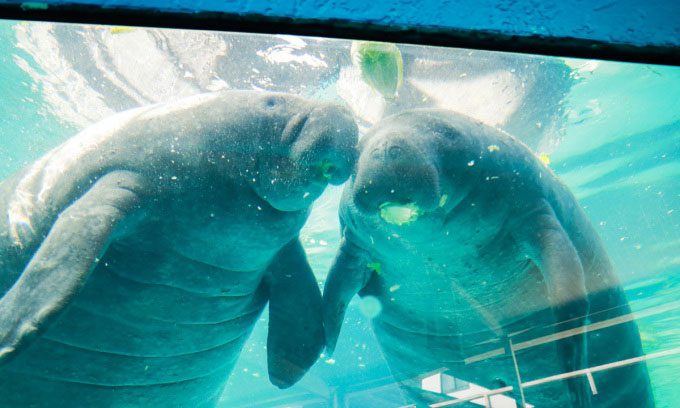The autopsy results revealed that the manatee named Hugh at the Mote Marine Laboratory and Aquarium in Florida died from injuries sustained during mating with his brother.
The Marine Mammal Pathology Laboratory of the Florida Fish and Wildlife Conservation Commission conducted an autopsy on the 38-year-old manatee Hugh and reported that the fatal injury was a 14.5 cm tear in the colon, NBC News reported on July 28. This injury was likely the result of mating with his brother, the manatee Buffett.

The manatees Hugh and Buffett. (Photo: Mote Marine Laboratory and Aquarium).
Hugh unexpectedly died on April 29 at the Mote Marine Laboratory and Aquarium in Florida. “On the day Hugh died, he and Buffett engaged in natural mating behavior that has been observed and recorded in manatees, both in the wild and in managed care. This was the first documented instance of such intense behavior between two manatees,” Mote Marine reported.
Mote Marine emphasized that the caretakers of Hugh did not believe he was in danger. The aquarium explained that, based on their observations, both Hugh and Buffett were seeking interaction with each other and showed no clear signs of distress or discomfort, such as grinding teeth or actively avoiding each other, which would have prompted staff to intervene.
The staff did not attempt to separate the manatees during mating for fear that such action might cause more harm. “Following veterinary guidance, a distraction method was chosen instead of physical separation, as separating them would have caused excessive anxiety and negatively impacted both manatees,” the aquarium explained.
Mating behavior among male manatees, including siblings, is not uncommon. “They are not particularly picky about who their partner is. When the urge strikes, they will mate with any partner present in the area, and if a female is nearby, that’s even better. However, if there are no females or only males around, they may exhibit mating behavior with any nearby individual,” said Jenessa Gjeltema, an associate professor at the UC Davis School of Veterinary Medicine.
Manatees typically live solitary lives, not in herds, leading to a weak sense of family structure, resulting in the interaction between brothers Hugh and Buffett. “Who is related to whom is not a significant factor in their interactions and social relationships,” Gjeltema explained.


















































